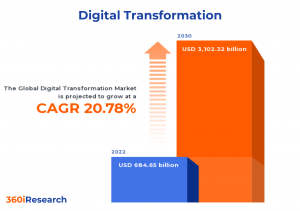The Global Digital Transformation Market to grow from USD 684.65 billion in 2022 to USD 3,102.32 billion by 2030, at a CAGR of 20.78%.
PUNE, MAHARASHTRA, INDIA , November 15, 2023 /EINPresswire.com/ — The “Digital Transformation Market by Offering (Services, Solutions), Function (Customer Transformation, Operational Transformation, Product Transformation), Technology, Deployment, End-User – Global Forecast 2023-2030″ report has been added to 360iResearch.com’s offering.
The Global Digital Transformation Market to grow from USD 684.65 billion in 2022 to USD 3,102.32 billion by 2030, at a CAGR of 20.78%.
Request a Free Sample Report @ https://www.360iresearch.com/library/intelligence/digital-transformation?utm_source=einpresswire&utm_medium=referral&utm_campaign=sample
The digital transformation uses digital technologies to develop new or modify existing business operations and customer experiences to fulfill changing business and market requirements. Digital transformation increases efficiency and provides greater business agility, ultimately unlocking new value for employees, customers, and shareholders. Increased penetration of evolving technologies for digitizing business and government enforcement towards digitization in developing economies has further driven the market demand. However, data security and privacy concerns in digital transformation systems may hamper the market demand in the forecasted period. Integrating AR/VR technologies in the transformation systems to enhance consumer experience presents future market opportunities.
Technology: Burgeoning utilization of big data and analytics technology owing to its data-driven decision-making processes
3D printing has revolutionized manufacturing by enabling on-demand and cost-efficient production of complex parts. Big data and analytics transform businesses by facilitating data-driven decision-making processes and enhancing customer experiences. Cloud computing is essential to digital transformation as it can improve operational efficiency and scalability for businesses. Cybersecurity is necessary for businesses amidst increasing cyber threats during digital transformation initiatives. Industrial robotics enhances production efficiency and reduces human errors in manufacturing lines. The Internet of Things (IoT) empowers businesses by connecting devices and systems for improved data collection and automation opportunities. Machine learning and artificial intelligence form the backbone of digital transformation initiatives by enabling automation and enhancing decision-making processes with data-driven insights. The rise of smartphones has driven the growth of social media platforms, which constantly evolve their offerings to maintain competitiveness in the digital marketing landscape.
Offerings: Significant adoption of solutions in digital transformation
Digital transformation services are essential for businesses seeking to adapt and advance in a rapidly evolving digital landscape. These services range from consultation and strategy development to implementation and support. Migrating to the cloud enables enterprises to optimize their operations through increased scalability, flexibility, and cost-efficiency, which requires cloud computing services. The increasing reliance on digital technologies comes with increased cyber threats requiring cybersecurity services. Businesses need to prioritize robust security measures to protect their data, systems, and customers. Digital transformation solutions comprise tailor-made software products designed to address businesses’ specific needs or challenges during their digital journey. Enterprise resource planning (ERP) Systems is a comprehensive software solution that combines all aspects of a business, such as finance, operations, and human resources. This enables organizations to streamline processes, improve efficiency, and make data-driven decisions. Customer relationship management (CRM) Software solutions help businesses effectively manage their interactions with current and potential customers. These tools allow organizations to track customer data and analyze customer behavior patterns and preferences to make informed decisions.
Function: Increasing use of customer transformation owing to the personalized engagement strategies
Customer Transformation focuses on enhancing customer experience, engagement, and loyalty through digital solutions, and the preference for this transformation arises from the increasing demand for personalized experiences and seamless omnichannel interactions. Operational transformation involves optimizing business processes, supply chain management, and internal operations through digital technologies. Product transformation refers to developing or enhancing products or services using digital technologies such as artificial intelligence (AI) and the Internet of Things (IoT). Workforce transformation consist of upskilling employees, implementing new workforce models, and leveraging collaboration tools to create an agile, digital-savvy workforce. Customer and workforce transformations focus on enhancing interpersonal communication, whereas operational and product transformations prioritize process optimization and innovation.
Deployment: Preferences for cloud-based deployment for better flexibility and services
The on-cloud deployment model refers to delivering software applications and infrastructure services via the Internet, utilizing remote servers managed by third-party service providers. This method has achieved significant traction in recent years due to its scalability, cost-effectiveness, and ease of management. The on-premises deployment model involves hosting applications and infrastructure within an organization’s own physical premises using privately owned servers and hardware. This option offers robust security measures and greater control over IT operations however may incur higher capital expenses and require dedicated maintenance staff.
End-User: Proliferating applications across banking and insurance sector with expanded digital infrastructure
The BFSI sector is adopting digital transformation strategies to enhance customer experiences and streamline operations. Digital transformation in education focuses on incorporating new technologies to improve teaching methods, personalized learning experiences, and remote learning accessibilities while ensuring data security and privacy for students’ information. Governments worldwide are leveraging digital transformation efforts to enhance public service delivery by providing e-governance platforms that streamline taxation or license procurement processes while ensuring transparency through open-data initiatives. Healthcare organizations are adopting digital transformation measures to improve patient care, reduce costs, and enhance research capabilities. The sector focuses on implementing Electronic Health Records (EHRs), telemedicine solutions, AI-driven diagnostics, and wearables for remote patient monitoring. The IT and telecom sector is consistently at the forefront of digital transformation due to their need for efficient network management and customer experience improvement. This industry invests heavily in cloud computing services, IoT device management, and AI applications for data analysis. Digital transformation in manufacturing involves adopting Industry 4.0 technologies such as IoT-enabled devices, advanced robotics systems for automation purposes, and additive manufacturing techniques, including 3D printing. Digital transformation in media & entertainment is driven by the shift from traditional broadcasting to digital platforms, the adoption of AR/VR technologies for immersive experiences, and leveraging AI-driven content personalization. Retail and consumer goods organizations are adopting digital transformation strategies for enhancing customer experiences through data-driven insights, personalized marketing campaigns, and eCommerce platform optimization.
Regional Insights:
The Americas has a significant landscape in the digital transformation market owing to a strong innovation ecosystem, with major technology companies leading the way in AI, IoT, and 5G adoption. The government supports digital transformation initiatives through funding and partnerships, with programs to accelerate public-private collaboration in key industries such as advanced manufacturing, agri-food, and clean technology. The European Union’s (EU) significant investments in AI, 5G networks, and cybersecurity across member countries and key initiatives and funding for various sectors, including digital transformation, have driven the market growth in the region. The Middle East’s governments are implementing initiatives to diversify their economies by embracing digitalization. Africa is experiencing rapid mobile penetration, which presents significant opportunities for digital transformation across industries. The APAC has a developing landscape in the digital transformation market due to government initiatives promoting investment in IoT, AI, robotics, and other advanced technologies, and numerous initiative seeks to strengthen connectivity and infrastructure while encouraging investment in emerging technologies.
FPNV Positioning Matrix:
The FPNV Positioning Matrix is essential for assessing the Digital Transformation Market. It provides a comprehensive evaluation of vendors by examining key metrics within Business Strategy and Product Satisfaction, allowing users to make informed decisions based on their specific needs. This advanced analysis then organizes these vendors into four distinct quadrants, which represent varying levels of success: Forefront (F), Pathfinder (P), Niche (N), or Vital(V).
Market Share Analysis:
The Market Share Analysis offers an insightful look at the current state of vendors in the Digital Transformation Market. By comparing vendor contributions to overall revenue, customer base, and other key metrics, we can give companies a greater understanding of their performance and what they are up against when competing for market share. The analysis also sheds light on just how competitive any given sector is about accumulation, fragmentation dominance, and amalgamation traits over the base year period studied.
Key Company Profiles:
The report delves into recent significant developments in the Digital Transformation Market, highlighting leading vendors and their innovative profiles. These include Accenture PLC, AVEVA Group PLC, Baidu, Inc., Cisco System Inc., Cognex Corporation, Emerson Electric Co., Ericsson AB, General Electric Company, Google LLC by Alphabet, Inc., Hewlett Packard Enterprise Company, Innominds, Intel Corporation, International Business Machines Corporation, Kellton Tech Solutions Ltd., Microsoft Corporation, NVIDIA Corporation, Oracle Corporation, Red Hat, Inc., Salesforce, Inc., SAP SE, Siemens AG, THALES group, TIBCO Software, Inc, Wipro Limited, and Yokogawa Electric Corporation.
Inquire Before Buying @ https://www.360iresearch.com/library/intelligence/digital-transformation?utm_source=einpresswire&utm_medium=referral&utm_campaign=inquire
Market Segmentation & Coverage:
This research report categorizes the Digital Transformation Market in order to forecast the revenues and analyze trends in each of following sub-markets:
Based on Offering, market is studied across Services and Solutions. The Solutions is projected to witness significant market share during forecast period.
Based on Function, market is studied across Customer Transformation, Operational Transformation, Product Transformation, and Workforce Transformation. The Workforce Transformation is projected to witness significant market share during forecast period.
Based on Technology, market is studied across 3D Printing or Additive Manufacturing, Big Data & Analytics, Cloud Computing, Cybersecurity, Industrial Robotics, Internet of Things, Machine Learning or Artificial Intelligence, and Mobility or Social Media. The Big Data & Analytics is projected to witness significant market share during forecast period.
Based on Deployment, market is studied across On-Cloud and On-Premises. The On-Cloud is projected to witness significant market share during forecast period.
Based on End-User, market is studied across BFSI, Education, Government, Healthcare, IT & Telecom, Manufacturing, Media & Entertainment, and Retail & Consumer Goods. The IT & Telecom is projected to witness significant market share during forecast period.
Based on Region, market is studied across Americas, Asia-Pacific, and Europe, Middle East & Africa. The Americas is further studied across Argentina, Brazil, Canada, Mexico, and United States. The United States is further studied across California, Florida, Illinois, New York, Ohio, Pennsylvania, and Texas. The Asia-Pacific is further studied across Australia, China, India, Indonesia, Japan, Malaysia, Philippines, Singapore, South Korea, Taiwan, Thailand, and Vietnam. The Europe, Middle East & Africa is further studied across Denmark, Egypt, Finland, France, Germany, Israel, Italy, Netherlands, Nigeria, Norway, Poland, Qatar, Russia, Saudi Arabia, South Africa, Spain, Sweden, Switzerland, Turkey, United Arab Emirates, and United Kingdom. The Americas commanded largest market share of 38.21% in 2022, followed by Europe, Middle East & Africa.
Key Topics Covered:
1. Preface
2. Research Methodology
3. Executive Summary
4. Market Overview
5. Market Insights
6. Digital Transformation Market, by Offering
7. Digital Transformation Market, by Function
8. Digital Transformation Market, by Technology
9. Digital Transformation Market, by Deployment
10. Digital Transformation Market, by End-User
11. Americas Digital Transformation Market
12. Asia-Pacific Digital Transformation Market
13. Europe, Middle East & Africa Digital Transformation Market
14. Competitive Landscape
15. Competitive Portfolio
16. Appendix
The report provides insights on the following pointers:
1. Market Penetration: Provides comprehensive information on the market offered by the key players
2. Market Development: Provides in-depth information about lucrative emerging markets and analyzes penetration across mature segments of the markets
3. Market Diversification: Provides detailed information about new product launches, untapped geographies, recent developments, and investments
4. Competitive Assessment & Intelligence: Provides an exhaustive assessment of market shares, strategies, products, certification, regulatory approvals, patent landscape, and manufacturing capabilities of the leading players
5. Product Development & Innovation: Provides intelligent insights on future technologies, R&D activities, and breakthrough product developments
The report answers questions such as:
1. What is the market size and forecast of the Digital Transformation Market?
2. Which are the products/segments/applications/areas to invest in over the forecast period in the Digital Transformation Market?
3. What is the competitive strategic window for opportunities in the Digital Transformation Market?
4. What are the technology trends and regulatory frameworks in the Digital Transformation Market?
5. What is the market share of the leading vendors in the Digital Transformation Market?
6. What modes and strategic moves are considered suitable for entering the Digital Transformation Market?
Mr. Ketan Rohom
360iResearch
+1 530-264-8485
[email protected]
![]()
Originally published at https://www.einpresswire.com/article/668658740/digital-transformation-market-worth-3-102-32-billion-by-2030-exclusive-report-by-360iresearch




